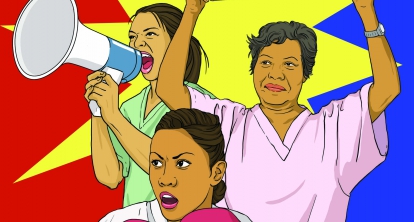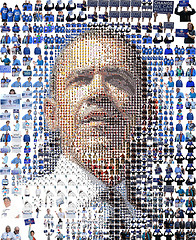
Catherine is the managing editor at Hyphen. Her work has appeared in TIME, the Bay Citizen, Ms. magazine, he Huffington Post, as well as broadcasted on CBS radio. She is a master's student at the UC Berkeley Graduate School of Journalism.

Catherine is the managing editor at Hyphen. Her work has appeared in TIME, the Bay Citizen, Ms. magazine, he Huffington Post, as well as broadcasted on CBS radio. She is a master's student at the UC Berkeley Graduate School of Journalism.
Help Hyphen fund an upcoming feature story on the challenges of incarcerating Hawaiians in Arizona prisons, which will appear in the November 2012 issue.
Filipino nurses fight back against discrimination in the workplace

Writer Catherine A. Traywick
Jane Sandoval can’t speak a lick of Tagalog — her parents made sure of that. “There’s no excuse for you to not speak well. You were born here,” her father used to tell his children, often punctuating this expectation with an adage gleaned from his own life as an emigrant from the Philippines: “There’s just too much competition.”
Critics at this year's New York Fashion Week seemed enamoured of Ralph Lauren’s less than pioneering embrace of one of fashion’s oldest tropes: Shanghai Chic. Critics eagerly dedicated valuable column inches to the collection, which featured all the mainstays of Asian-inspired fashion: jade jewelry, golden dragons, cheongsams. While some candidly wondered whether the designer’s invocation of China was a statement about the nation’s growing economic competitiveness, others were simply happy to break out as many tired euphemisms for “Eastern” as possible. (Not only did the “Orient Express” make several stops but East, inevitably, met West.)
At this year's Kollaboration LA show, founder and executive director Paul "PK" Kim said his goodbyes to an audience of 5,000+ people, having realized his dream of taking Kollaboration to 10 cities in 10 years. Fittingly, the 3-hour show was chock-full of memorable moments: Assembly Ted Lieu stopped in to deliver a census PSA, journalist Lisa Ling demonstrated how easy it is to join the bone marrow donation registry, and a girl wearing 3-inch, sling-back heels beat out 5 break-dancing, be-sneakered boys in the freestyle dance competition (no contest).
As if we small-breasted ladies didn't have it hard enough. We persevered through adolescences marred by a devastating lack of top-growth, endured comings-of-age minimized by the diminutive jabs of our bustier peers, and, as adults, find ourselves woefully relegated to Victoria's Secret's young teen "Pink" section, from where we covetously eye the perfectly impractical lacy/strappy/barely-there/disgustingly-provocative underthings so accessibly-sized for plumper patrons. Since childhood, men, magazines, and our mothers have ridiculed our relative lack of endowment, so maybe it was only a matter of time before whole governments made our bitty busts their business.
The first to do so: Australia, whose government censors are banning adult publications and films that feature women with small breasts, in an effort to -- get this -- curb pedophilia. Now, I'm no porn apologist, but I rather dislike having my body categorically likened to a child's, even more than I vehemently dislike censorship. [As I always say: It ain't much, but it sure ain't nothin'!] And it seems obvious to me that an industry founded on fake tits, fake orgasms, and the general fictionalizing of women's sexuality is only made worse by censors that further restrict it from realistically depicting women's bodies -- however flat-chested those bodies may be.
 Photo by Oskari Kettunen, used under Creative Commons License.
Photo by Oskari Kettunen, used under Creative Commons License.
In a perfect world, though, a 22-year wait for the sake of family
reunification and the pursuit of the American dream wouldn't land you
in a place where...
As do-gooding overachievers straddling transnational, cross-cultural and inter-generational divides simultaneously, Asian American activists are a breed unto ourselves. Carefully crafted by overbearing parents into perfectionist pinnacles of productivity, we boast: cognitive abilities honed at a young age by bilingualism, an inviolable sense of duty and discipline instilled by the stringent mores of a conservative household, and bleeding liberal hearts touched by the experiences of prejudice and injustice that come from growing up mixed-raced, multicultural, and/or just plain different. Not to brag, but we are also awfully good-looking. This favorable combination of intelligence, skill and soul that forms the Asian American Activist is unique among do-gooders. We could be social change powerhouses, if we wanted to.
activist forebears staged revolutions throughout Asia: the Indian
Independence Movement founded on passive resistance, the People Power
Revolution of the Philippines which peacefully ousted a corrupt
dictator, the Indonesian National Revolution which freed the country
from colonial Dutch rule... and so forth. Just a few decades ago, our
own American progenitors founded the Yellow Power Movement and coined
the term "Asian American" as a statement of unity and rejection of
racial stratification.
Today's Asian American activists are, by comparison, doin' alright... We're not radicals, but we're still out there, putting our skills to good use. We may have mainstreamed a little, either shedding ourselves of our seemingly incidental Asian American cloak or hyphening ourselves out the American way with a string of extremely specific identity markers, but the point is we're still activists. Activating. Against stuff. Or for stuff, whichever the case may be.

"Two-thirds of Americans now say race relations
are generally good, and the percentage of blacks who say so has doubled
since last July..."
If only the public's perception of "progress" were motivated by actual progress. Even a cursory examination of the state of race relations in the US will reveal that we are still a very racially divided nation, in some ways even more so than before Obama's election. The Southern Poverty Law Center, for example, just released a report which found that the number of hate groups in the US has increased by more than 50 percent since 2000, and by 5 percent since last year. SPLC attributes the increase, in part, to growing anti-immigrant sentiment -- a key point to remember, as Obama's rise seems to have us thinking about race relations exclusively in black and white.
Earlier this week, Racialicious guest blogger Thea Lim deconstructed a controversial NYT blog post which details a white woman's experiences and concerns as she raises her mixed-race child. The author (and white woman in question), Nicole Sprinkle, very honestly describes her desire to incorporate her husband's Colombian heritage into her daughter's upbringing while prioritizing and carefully cultivating her white identity:
"Yes, she would learn Spanish and
English, but to emphasize her Latina side, I felt, was somehow a
disservice. Frankly, I didn't want her to lose any of the privileges of
being white. [...] I just wanted the eyelashes, and
cheekbones, and that lyrical Spanish when appropriate. I wanted the
good stuff, and from both sides."
...It gets worse. Read the whole article to get the full effect. Lim responds somewhat emotionally to Sprinkle's unabashed prejudice. As a mixed-race person myself, who was raised to value my (father's) whiteness above my (mother's) Filipina heritage, my initial reaction to the article left me too appalled to be articulate, so I asked another mixed-race friend of mine to break it down. She sent me the following thoughtful analysis:
Likely you've already seen this gem from Mixed Company of Yale -- but in case you haven't: it's a racialized parody of Beyonce's "All the Single Ladies." Here it is for your viewing pleasure (lyrics after the jump):
I've been trying to make sense of how I feel about this video since it came out a couple of weeks ago...and am still torn between what little of it I find amusing and the rest of it, which I find tasteless and insulting (Seriously: Are there really any AsAms who think that "me love you long time" is anything other than an offensive, sexist, racist trope?).
The arguably racist/sexist overtones of the video are obvious and have been covered pretty widely by other blogs, so I won't go into that here. Besides, I'm less interested in dissecting why/how the piece is racist or sexist than I am in why the video is (meant to be) funny -- particularly to the women who created it. Are these women poking fun at racists/racism by performing every stereotype associated with Asian women, a la "hipster racism"? Or are they simply making fun of Asian women? And for whom are they ultimately performing?
Ben Hwang over at 8Asians recently took issue with my post "Reverse Racism at Princeton..." because, according to himself, the South, and the Urban Dictionary, "reverse racism" is a misnomer, or non-existent, or something along those lines:
"Hyphen's recent blog post about Princeton University's "Reverse Racism" was amusing to me, especially since the terminology was used incorrectly -- it's not reverse racism, it's just racism. (Especially ironic since I learned this after I moved to the South.)"
Far be it from me to contradict the teaching of "the South," but I get the feeling that Ben doesn't exactly get it. Then again, his sources included the third (not to be confused with the first or the second) definition of "racism" provided by dictionary.com, as well as some of the less articulate
definitions of "reverse racism" posted at the Urban Dictionary, which he describes as his "reference for all things slang this side of Wednesday."
While I do appreciate the obviously extensive research he conducted in an effort to understand the tricky concept of "reverse racism," I think his analysis would have benefited a tiny a bit had he scrolled down the Google search results page a little further to discover either of the following links:
If he had, he might see that these essays, like both his post and mine, question the validity of the notion of "reverse racism." Unlike Ben, however, we don't take issue with the concept because we find it equivalent to "racism" -- on the contrary.
The Prox, a Princeton University blog hosted by the Daily Princetonian, published a piece earlier this week about an incident of purported racism in one of its classrooms:
Raphael Balsam '11, a Bloomberg Hall resident, was working on a computer in the third
floor computer room when he noticed Chinese written on the blackboard
last Sunday. He was surprised to learn that the writing translated to:
"White people can't see this / White people can't read this / White
people can't understand this" and immediately notified an RCA, Carrie
Carpenter '10.
Evidently the chalkboard scrawl has caused a bit of a stir, inciting an investigation into whether or not the message was a violation of the university's Rights, Rules, and Responsibilities.
According to Roger Wang, a photographer for the Princetonian, most of those present when the message was deciphered treated it lightly, but, "I feel
that there was a true concern regarding how the writing could be seen
as a joke while an attack in English would suffer severe consequences."
Since writing my last entry on the Asian Fetish Myth, I've received some interesting responses. Most of them have implied that, while Asian women are fetishized by white men, Asian women perpetuate the fetish by favoring white men in the dating game (I believe Neela commented on this as well).
That Asian Fetish Myth thing is making news again -- though this time no one's debunking it.
After eight years of disappointment, my nihilistic veneer is cracking. It's been less than two weeks since Obama's inauguration but he's already signed executive orders to close Guantanomano, seal CIA detention centers worldwide, end torture, institute transparency at the highest level of government, and repeal the Global Gag Rule -- in effect, making the world a better place. Who knew that pen-wielding could have such superheroic implications? (says the journalist).
Last week, our new pres kept up his hyper-progressive momentum, with the signing of the Lilly Ledbetter Fair Pay Act, a bill that restores individuals' ability to challenge unequal pay.